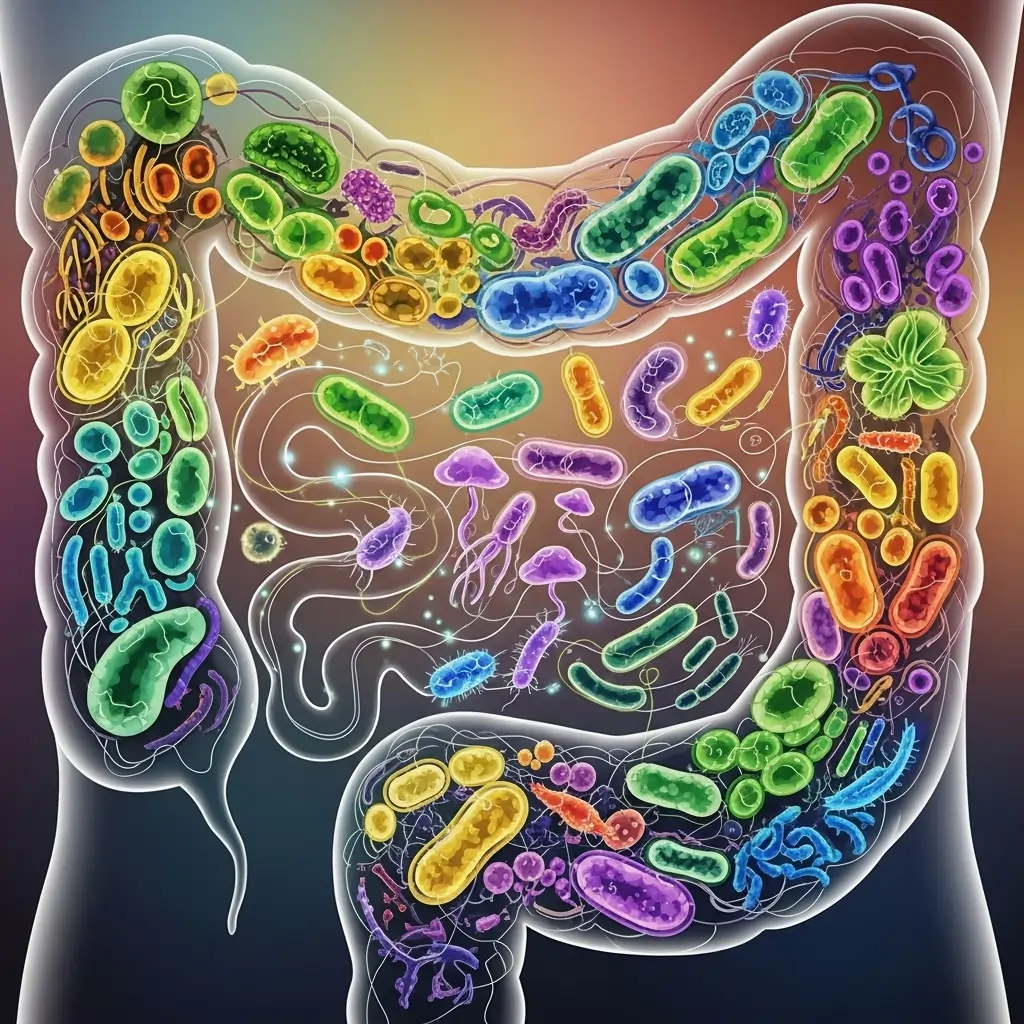Quick Answer: Fermented Foods Gut Health
Fermented foods are rich in beneficial live bacteria, known as probiotics, which significantly enhance gut health. By introducing diverse microbial strains to your gut microbiome, these foods aid digestion, improve nutrient absorption, and strengthen the immune system. Regular consumption helps balance gut flora, fostering a resilient internal environment for overall well-being.
Table of Contents
- The Ancient Secret to Modern Health: Fermented Foods & Your Gut
- Understanding Your Gut Microbiome: The Inner Ecosystem
- Beyond Digestion: The Multifaceted Benefits of Fermented Foods
- The Fermentation Magic: How Microbes Work Their Wonders
- Navigating Fermented Foods: Risks, Side Effects, and Who Should Be Cautious
- Making Fermented Foods a Daily Habit: Easy Integration Tips
- From Store to Plate: Selecting High-Quality Fermented Foods
- Your Fermented Food Questions, Answered by Experts
- Embrace the Fermented Future: A Path to Holistic Health
- Start Your Fermentation Journey Today!
- Important Health & Safety Information
The Ancient Secret to Modern Health: Fermented Foods & Your Gut
For millennia, cultures across the globe have harnessed the transformative power of fermentation, turning simple ingredients into nutrient-dense staples. From the crisp tang of Korean kimchi to the savory depth of German sauerkraut, these traditional practices were born out of a need for preservation. Yet, they offered far more than just extended shelf life. Today, as we increasingly seek natural pathways to well-being, the wisdom of these ancient methods is more relevant than ever, especially when it comes to understanding the profound connection between fermented foods and gut health. The numerous fermentation benefits extend beyond mere taste, impacting our bodies in ways modern science is only beginning to fully appreciate.
In recent years, the conversation around health has shifted significantly, placing the intricate world within our intestines – our gut microbiome – at its very core. No longer just a processing plant for nutrients, a thriving gut is now recognized as a cornerstone of overall vitality. Rigorous research continues to unveil its far-reaching influence, from optimizing digestive health and nutrient absorption to playing a crucial role in mood regulation and delivering a significant immune system boost. It’s clear that nurturing this internal ecosystem is paramount to our well-being, and many are now asking: “how can I support my gut health naturally?”
This is where the power of fermented foods truly shines. By introducing a diverse array of living, beneficial bacteria – often referred to as probiotic foods – they actively enrich your gut microbiome. These microscopic allies work tirelessly, helping to break down food, synthesize vitamins, and even communicate with our immune cells. We’ll delve into the fascinating science behind fermented foods and gut health, exploring how fermented foods improve digestion and contribute to a resilient internal environment. While embarking on this journey, understanding proper preparation is key to avoiding common pitfalls, implicitly addressing any potential risks of fermented foods for gut health. Join us as we explore the best fermented foods for gut health and discover practical, delicious ways of incorporating fermented foods into diet, empowering you to cultivate a healthy, thriving gut from the comfort of your own kitchen.

Understanding Your Gut Microbiome: The Inner Ecosystem
Imagine a bustling, microscopic city thriving right inside you – that’s your gut microbiome. This intricate community of trillions of microorganisms, including bacteria, fungi, and viruses, resides primarily in your digestive tract. Far from being mere passengers, these tiny inhabitants play a monumental role in your well-being, acting as a crucial inner ecosystem that influences nearly every aspect of your health.
The gut microbiome’s responsibilities extend far beyond simple digestion. These beneficial microbes are vital architects of your digestive health, breaking down complex carbohydrates that your body can’t process on its own. This process not only aids in nutrient absorption but also facilitates the synthesis of essential vitamins, such as B vitamins and vitamin K. They are the unsung heroes working diligently to extract every last bit of goodness from the food you consume.
A truly thriving inner ecosystem is characterized by its diversity and balance. A wide variety of beneficial bacterial strains ensures a robust and resilient system, capable of adapting to different dietary inputs and environmental stressors. Research consistently highlights the profound connection between a diverse gut microbiome and overall health, including a significant immune system boost. When your gut is thriving, it’s better equipped to defend against pathogens and inflammation, laying a strong foundation for vitality. This is where the profound fermentation benefits truly shine, as they introduce a spectrum of live, beneficial bacteria to enrich this crucial diversity.
However, when this delicate balance is disrupted, a state known as dysbiosis can occur. This imbalance, often caused by factors like poor diet, stress, antibiotics, or environmental toxins, can lead to a reduction in beneficial microbes and an overgrowth of less desirable ones. The implications of dysbiosis can be far-reaching, contributing to digestive discomfort, nutrient deficiencies, weakened immunity, and even affecting mood and cognitive function. Understanding this connection underscores why supporting your gut health is not just about avoiding illness, but about cultivating optimal wellness.
This is precisely why we champion fermented foods gut health. These probiotic foods are a natural, delicious way to introduce a wealth of beneficial bacteria into your system, helping to restore balance and foster diversity within your microbiome. The science behind fermented foods and gut health is robust, showing how these living foods can profoundly improve digestion and enhance overall well-being. While exploring risks of fermented foods for gut health is important for sensitive individuals (always listen to your body and start slowly), for most, incorporating fermented foods into diet is a powerful step towards nurturing their inner ecosystem. From sauerkraut to kimchi, the best fermented foods for gut health offer accessible and delicious pathways to a healthier, happier you.

Beyond Digestion: The Multifaceted Benefits of Fermented Foods
Fermented foods are more than just tangy delights; they’re a cornerstone for your well-being, especially when it comes to nurturing your inner ecosystem. While often associated primarily with digestive health, the true spectrum of fermentation benefits extends far beyond, touching upon immunity, mood, and even nutrient absorption. Let’s delve into the remarkable science behind fermented foods and gut health.
Nurturing Your Gut: The Core of Digestive Harmony
One of the most celebrated aspects of fermented foods gut health is their profound impact on your digestive system. So, how fermented foods improve digestion? It’s all thanks to the incredible work of beneficial bacteria, like Lactobacillus and Bifidobacterium, which naturally proliferate during the fermentation process. These probiotic foods introduce a diverse and active army of helpful microbes to your gut microbiome.
These tiny allies don’t just take up residence; they actively contribute to your digestive health. They help break down complex carbohydrates and proteins, essentially pre-digesting food and making nutrients easier for your body to absorb. Additionally, they produce enzymes that further aid in digestion, easing the burden on your system and helping you feel lighter and more comfortable after meals.
Fortifying Your Defenses: An Immune System Boost
Beyond simply aiding digestion, consistent consumption of fermented foods for gut health plays a crucial role in giving your immune system a boost. Did you know that a significant portion of your immune system resides in your gut? The beneficial bacteria from probiotic foods help to strengthen the gut barrier, a vital protective layer that acts as a first line of defense against unwanted pathogens and toxins.
By fostering a robust and diverse gut microbiome, these foods also help modulate immune responses. This means they can fine-tune your body’s ability to fight off illness, ensuring an effective response without overreacting. By nurturing a healthy gut, you’re essentially building a stronger internal shield, ready to tackle whatever comes its way.
The Gut-Brain Connection: Mood, Mind, and Microbes
The fascinating and increasingly understood connection between your gut and your brain, known as the gut-brain axis, is another area where fermentation benefits truly shine. Your gut is often called your “second brain” because it produces many of the same neurotransmitters found in your brain, including serotonin, which plays a key role in mood regulation. The gut microbiome, profoundly influenced by fermented foods gut health, plays a direct role in this intricate communication system.
Emerging research on the science behind fermented foods and gut health suggests that regular consumption of probiotic foods can positively impact mood, reduce stress, and even enhance cognitive function. Imagine a clearer mind and a brighter outlook, all supported by the active life within your gut.
Enhanced Nutrition and Anti-Inflammatory Power
Another remarkable aspect of fermented foods gut health is their ability to enhance the bioavailability of nutrients. Fermentation can break down anti-nutrients (compounds that inhibit nutrient absorption) and even synthesize new vitamins, such as B vitamins and Vitamin K. This means your body can more easily access and utilize the goodness from your food, getting more nutritional value from every bite.
Furthermore, many fermentation benefits extend to their potential anti-inflammatory effects. The beneficial compounds and short-chain fatty acids produced during fermentation can help calm inflammation throughout the body, contributing to overall wellness and potentially alleviating symptoms of chronic conditions. While understanding the risks of fermented foods for gut health is important (though generally low when prepared correctly), the array of positives makes incorporating fermented foods into diet a truly worthwhile endeavor. From a crisp, tangy bite of sauerkraut to a sip of bubbly water kefir, these are truly among the best fermented foods for gut health.

The Fermentation Magic: How Microbes Work Their Wonders
When you delve into the world of fermented foods, you’re not just creating delicious, tangy treats; you’re unleashing a microscopic army of beneficial bacteria poised to transform your gut health. This is the elegant science behind fermented foods and gut health, a captivating process where tiny, unseen organisms perform incredible feats of transformation.
At the heart of lacto-fermentation, we introduce living, beneficial bacteria—primarily Lactobacillus strains naturally present on vegetables—into our food. As these microbes begin their work, converting sugars into lactic acid, they multiply, creating a rich source of what we call probiotics. When consumed, these active, living cultures become potent probiotic foods, populating and enriching your gut microbiome. Imagine a bustling, diverse ecosystem within your digestive tract, working tirelessly for your well-being and contributing significantly to your overall digestive health.
One of the most remarkable fermentation benefits is how these microbes essentially “pre-digest” our food. They consume the complex carbohydrates and sugars present in vegetables, breaking them down into simpler, more absorbable forms. This means that essential nutrients—vitamins, minerals, and other vital compounds—become more bioavailable, or easier for your body to access and utilize. This is precisely how fermented foods improve digestion, making the entire process more efficient and less taxing on your system, often resulting in a satisfyingly crisp texture and bright flavor.
But the magic doesn’t stop there. As these beneficial bacteria thrive and interact within your gut, they produce a fascinating array of compounds known as postbiotics. Think of postbiotics as the beneficial byproducts of microbial activity. These include organic acids, enzymes, and short-chain fatty acids like butyrate, which play crucial roles in maintaining a healthy gut lining, reducing inflammation, and even sending signals to other parts of your body. This intricate communication network contributes to an immune system boost, strengthening your body’s natural defenses from within.
To truly optimize your fermented foods gut health journey, it’s also important to understand the role of prebiotics. While probiotics are the beneficial microbes themselves, prebiotics are the specific types of non-digestible dietary fiber that act as food for these good bacteria. Found abundantly in foods like garlic, onions, and asparagus, prebiotics nourish your gut microbiome, helping your probiotics flourish and ensuring their continued activity. Combining a diet rich in both prebiotics and probiotic foods creates a powerful synergy, setting the stage for optimal digestive health.
Pro-Tip: Fermentation time is largely influenced by temperature. Warmer environments (around 70-75°F / 21-24°C) will speed up the process, while cooler temperatures (below 65°F / 18°C) will slow it down. Adjust your fermentation schedule accordingly, tasting regularly until you reach your desired flavor and texture.
Exploring the best fermented foods for gut health means embracing diversity – from crisp, tangy sauerkraut to vibrant kimchi, or even our own signature fermented carrots. By regularly incorporating fermented foods into your diet, you’re not just adding a complex, lip-smacking flavor; you’re actively cultivating a thriving internal ecosystem. It’s an empowering step towards holistic wellness, and we’re here to guide you every step of the way.

Navigating Fermented Foods: Risks, Side Effects, and Who Should Be Cautious
The journey into the world of fermented foods for gut health is often one of delicious discovery and profound wellness. These incredible probiotic foods offer a wealth of fermentation benefits, from supporting a thriving gut microbiome to enhancing overall digestive health and providing an immune system boost. However, like any powerful dietary change, it’s wise to approach them with awareness and respect for your body’s unique needs. Understanding potential initial side effects, specific sensitivities, and crucial safety practices ensures your fermentation journey remains positive and beneficial.
Starting Slow: Adjusting to a New Gut Microbiome
When you begin incorporating fermented foods into your diet, it’s common for your body, especially your gut microbiome, to undergo an adjustment period. Think of it as a lively party starting in your digestive system! This influx of new, beneficial bacteria can sometimes lead to initial, mild side effects such as temporary bloating, gas, or changes in bowel movements. This is often a sign that your gut is adapting and rebalancing.
To make this transition smooth, we strongly advise starting with very small portions. A tablespoon or two of sauerkraut or a small sip of kombucha daily can be enough to introduce these potent probiotic foods. Gradually increase the amount as your body adjusts. This gentle introduction allows your gut microbiome to acclimate to its new inhabitants, helping you experience how fermented foods improve digestion without discomfort.
Understanding Histamine Intolerance
For most, the complex flavors and fermentation benefits are purely positive. However, some individuals may have a sensitivity known as histamine intolerance. Fermented foods, being rich in microbial activity, naturally contain varying levels of histamines, which are compounds produced during the fermentation process. In sensitive individuals, consuming high-histamine foods can trigger symptoms like headaches, skin rashes, digestive upset, or nasal congestion.
If you suspect you have histamine intolerance, or experience these symptoms after consuming fermented foods, it’s wise to proceed with caution. You might try focusing on quicker ferments or those generally lower in histamines, and always listen to your body. For a deeper dive into the science behind fermented foods and gut health in relation to histamine, consulting a dietitian or doctor is recommended.
Safety Notes: Home Fermentation Essentials
While the risks of fermented foods for gut health are minimal when prepared correctly, proper food safety and hygiene are paramount, especially when making ferments at home. Our goal at Fermention.com is to empower you to ferment safely and confidently. This means adhering to strict cleanliness and understanding the visual cues of a healthy ferment versus spoilage.
Always use sterilized wide-mouth glass jars and ensure your vegetables are completely submerged under the brine using a fermentation weight. This creates the crucial anaerobic environment that beneficial bacteria need to thrive, while inhibiting harmful molds and pathogens. Remember to use non-iodized salt as iodine can kill the very microbes we want to encourage.
🚨 IMMEDIATE RED FLAGS:
- Fuzzy mold: Any color (black, green, pink, white fuzzy texture)—DISCARD ENTIRE BATCH. This is not kahm yeast.
- Putrid odors: Rotten egg or sewage smells (distinct from the pleasantly tangy or funky aromas of healthy ferments).
- Mushy texture: Beyond a slight softening, this can indicate harmful bacterial contamination.
- Pink discoloration: Especially in garlic ferments, this can be a potential botulism indicator.
If you ever encounter these signs, trust your instincts and err on the side of caution—it’s always better to start fresh than risk your digestive health.
When to Consult Your Doctor: Vulnerable Populations
While fermented foods for gut health offer immense potential, certain individuals should exercise extra caution and, most importantly, consult a healthcare provider before making significant dietary changes.
- Immunocompromised individuals: Those with weakened immune systems, due to illness or medication, should discuss the consumption of live probiotic foods with their doctor.
- Pregnant women: While many fermented foods are generally considered safe during pregnancy, it’s always best to consult your obstetrician for personalized advice, especially regarding home-fermented products.
- Individuals with specific health conditions: If you have severe digestive disorders (like SIBO, Crohn’s disease, or ulcerative colitis), a history of histamine intolerance, or other chronic health issues, a doctor or registered dietitian can provide tailored guidance on incorporating fermented foods into their diet safely and effectively. They can help you understand the specific science behind fermented foods and gut health as it pertains to your unique physiology.
Embracing fermentation benefits is an exciting journey for your digestive health and overall well-being. By starting slowly, understanding potential sensitivities, prioritizing impeccable home safety, and seeking professional advice when needed, you can confidently explore the world of probiotic foods and discover the best fermented foods for gut health that truly nourish you.

Making Fermented Foods a Daily Habit: Easy Integration Tips
Embracing the world of fermentation is a journey that promises unique flavors and profound fermentation benefits for your well-being. The science is clear: fermented foods gut health are intrinsically linked, offering a natural pathway to nurture your inner ecosystem. Making these incredible probiotic foods a regular part of your diet doesn’t have to be daunting; it’s about simple, consistent steps that build lasting habits.
Start Small, Stay Consistent
When you begin incorporating fermented foods into diet, the key is to introduce them gently. Think of it as a friendly welcome for your gut microbiome. We recommend starting with small, consistent portions, allowing your digestive system to gradually acclimate. A single tablespoon of crisp, tangy sauerkraut with your lunch, or a few sips of a refreshing water kefir daily, is an excellent starting point. This measured approach helps your body adjust to the influx of beneficial bacteria, laying a strong foundation for optimal digestive health. Don’t rush it; your gut will thank you for the patience.
Embrace the Delicious Diversity
One of the most exciting aspects of fermented foods is their incredible variety! To truly reap the fermentation benefits and support a diverse gut microbiome, explore beyond just one type. Wondering about the best fermented foods for gut health? The answer lies in variety! Dive into the spicy, complex flavors of Korean kimchi, the savory depth of tempeh, or the umami richness of miso. Experiment with different lacto-fermented vegetables like dilly green beans, fiery carrots, or classic cucumber pickles. Even sourdough bread, with its characteristic tang, offers a unique profile of beneficial microbes. Each fermented food brings its own unique spectrum of living beneficial bacteria, contributing to a more robust and resilient immune system boost.
Simple Serving Suggestions for Everyday Meals
Integrating these powerhouses into your daily routine is easier than you think. You don’t need elaborate recipes; often, the simplest additions are the most impactful. Here are a few ideas to get you started:
- Salad Topper: Add a spoonful of fermented carrots or sauerkraut to your greens for a bright, tangy crunch.
- Sandwich & Wrap Enhancer: Layer kimchi or fermented pickles onto your favorite sandwich for an explosion of flavor and probiotics.
- Smoothie Boost: A splash of water kefir or a dollop of unsweetened fermented dairy (like plain yogurt or kefir) can add a creamy texture and a probiotic punch to your morning blend.
- Savory Side Dish: Serve a small portion of any fermented vegetable alongside your main meal. Its bright acidity cuts through richness and aids digestion.
- Omelet or Scramble Addition: Stir in a tablespoon of finely chopped sauerkraut or kimchi at the end of cooking for a unique twist.
These simple methods are excellent examples of how fermented foods improve digestion by providing enzymes and beneficial bacteria that support nutrient absorption and gut function.
Listen to Your Body: A Gentle Approach
As you begin your journey with fermented foods gut health, it’s crucial to listen to your body. While the science behind fermented foods and gut health overwhelmingly points to positive outcomes, some individuals may experience mild, temporary digestive changes (like gas or bloating) initially. This is usually a sign that your gut microbiome is adjusting and rebalancing. Don’t worry; it’s normal!
Gradually increase your intake as tolerated, paying attention to how you feel. If you notice any discomfort, simply reduce your portion size for a few days before attempting to increase again. We emphasize building confidence, not fear, so understanding these minor, temporary adjustments helps avoid perceived risks of fermented foods for gut health. With patience and consistency, you’ll soon discover the energy and improved well-being that these incredible foods can bring to your life.

From Store to Plate: Selecting High-Quality Fermented Foods
Embracing the world of fermented foods for gut health is a transformative step towards holistic wellness. But with so many options crowding grocery store shelves, how do you discern the truly beneficial from the merely flavorful? Choosing wisely ensures you’re getting the most potent probiotic foods to nourish your gut microbiome and support your overall digestive health. Let’s dive into becoming a discerning ferment consumer.
The Label’s Tale: Seek “Live and Active”
The first, and perhaps most critical, step in selecting high-quality fermented foods is to scrutinize the label. For a product to truly deliver the fermentation benefits we seek, it must contain living, beneficial microbes. Look for clear indications like:
- “Live and Active Cultures”: This phrase, often found on yogurt, kefir, and some vegetable ferments, assures you that the beneficial bacteria are present and thriving. These are the microscopic heroes that contribute to your gut microbiome.
- “Unpasteurized”: Pasteurization, while extending shelf life, involves heating that kills off the very live cultures we desire. An “unpasteurized” label is a strong indicator that the product retains its full probiotic potential. If it’s shelf-stable and doesn’t explicitly state “live,” it’s likely pasteurized and won’t offer the same immune system boost through live probiotics.
Without these indicators, you might just be buying a tasty, tangy food, but one that lacks the potent, living contribution to your gut health.
Ingredient Integrity: Less is More
Beyond the “live” factor, a quick glance at the ingredient list can tell you volumes about a fermented food’s quality. When it comes to nurturing your gut microbiome, simplicity is key. High-quality fermented foods should feature:
- Minimal, Whole Ingredients: Think cabbage and salt for sauerkraut, or cucumbers, garlic, and dill for pickles. The fewer the ingredients, the closer it is to traditional, pure fermentation. This helps maximize the science behind fermented foods and gut health.
- Avoid Added Sugars: Many commercial fermented products, especially yogurts, kefirs, or even some kombuchas, can be laden with added sugars. While some sugar is necessary for the fermentation process itself, excessive added sugars can undermine the very digestive health benefits you’re seeking.
- Steer Clear of Artificial Additives or Preservatives: These ingredients can interfere with the delicate balance of beneficial bacteria or simply add unnecessary chemicals to your diet. The natural preservation power of lactic acid means artificial preservatives aren’t needed in true fermented foods. Look for natural colors and a clean, tangy aroma – these are often signs of pure ingredients.
Choosing products with clean ingredient lists ensures you’re getting the unadulterated fermentation benefits without counterproductive additions.
Trusting Your Source: Reputable Brands and Local Artisans
Just as important as what’s in the jar is who put it there. To ensure quality and safety, especially when considering the risks of fermented foods for gut health (like improper handling leading to spoilage), it’s wise to:
- Choose Reputable Brands: Established brands often have rigorous quality control processes and a transparent approach to their fermentation methods. They understand the science behind fermented foods and gut health and prioritize safe production.
- Support Local Producers: Farmers’ markets and local health food stores are often treasure troves of artisanal ferments. These producers often use traditional methods, fresh, seasonal ingredients, and are passionate about their craft. Don’t hesitate to ask them about their process – their enthusiasm and knowledge are often great indicators of quality. Plus, you can often taste-test to find your favorite tangy, crisp, and complex flavors!
The Ultimate Fermentation Journey: DIY at Home
While selecting excellent store-bought options is convenient, there’s an unparalleled satisfaction and benefit to making your own fermented foods at home. When you ferment your own vegetables, you have complete control over every ingredient, ensuring you’re creating the best fermented foods for gut health tailored to your preferences.
The journey of home fermentation not only provides you with highly potent probiotic foods but also deepens your understanding of how fermented foods improve digestion through direct experience. You witness the active bubbling, smell the pleasant, pungent aromas, and taste the evolving tanginess as the beneficial microbes work their magic. It’s an empowering way to truly integrate fermented foods gut health into your daily life, offering a unique connection to ancient traditions and modern science.
By following these guidelines, you’ll be well-equipped to select or create high-quality fermented foods, confidently incorporating fermented foods into your diet and reaping the abundant rewards for your digestive health and overall well-being.

Your Fermented Food Questions, Answered by Experts
Navigating the world of fermented foods for gut health can bring up a lot of questions. At Fermention.com, we believe that understanding the “why” behind these incredible creations empowers you to embrace them confidently. Here, we tackle some of the most common inquiries, offering clear, scientific, yet encouraging answers to support your journey towards a thriving gut microbiome and vibrant digestive health.
How often should I eat fermented foods for gut health?
When it comes to nurturing your gut microbiome, consistency is far more powerful than intensity. We recommend starting small and making probiotic foods a regular, integrated part of your daily diet. Think of it as a gentle, ongoing conversation with your gut, rather than a one-time shout.
Begin with just a tablespoon or two of a fermented vegetable like sauerkraut or kimchi, or a small glass of water kefir, once a day. Observe how your body responds. Many people find that after a week or two, they can comfortably increase their intake to a small serving with each meal, or simply enjoy a wider variety of best fermented foods for gut health throughout the day. The goal is to introduce a diverse array of beneficial bacteria regularly. Different fermentation benefits come from different strains, so rotating your ferments—from crisp krauts to tangy yogurts to bubbly kvass—is an excellent strategy to support a robust and varied inner ecosystem. This consistent, varied approach is key to truly incorporating fermented foods into your diet for sustained digestive health.
Are all fermented foods probiotic?
This is a fantastic question that gets to the heart of what makes fermented foods so special! While all fermented foods undergo a transformation by microbes, not all of them qualify as true probiotic foods that deliver live, beneficial bacteria to your gut.
The key distinction lies in whether the finished product contains live and active cultures at the point of consumption. For example, a naturally lacto-fermented vegetable like sauerkraut or kimchi, or a homemade kombucha, is typically rich in live beneficial bacteria because it hasn’t been heated or processed in a way that kills them. These are excellent examples of probiotic foods that contribute directly to your gut microbiome.
However, some fermented products, while delicious and often more digestible than their unfermented counterparts, are pasteurized or baked. Sourdough bread, for instance, is made with a fermented starter, but the baking process eliminates the live cultures. Similarly, many store-bought pickles are vinegar-brined and pasteurized, meaning they lack the live bacteria found in truly fermented pickles. So, when seeking fermented foods for gut health, always look for labels that specify “live and active cultures” or “unpasteurized” to ensure you’re getting the full fermentation benefits for your digestive health. The science behind fermented foods and gut health is clear: it’s the living microbes that deliver the goods.
Can children eat fermented foods?
Absolutely! Children, just like adults, can benefit from fermented foods for gut health. Introducing these nutrient-dense, enzyme-rich foods early can help establish a healthy gut microbiome and potentially offer an immune system boost. Many traditional cultures have long incorporated fermented foods into children’s diets.
However, just as with any new food, especially for little ones, moderation and observation are key. Start with very small amounts—perhaps a tiny spoonful of mild sauerkraut or a sip of water kefir diluted with juice—and choose milder flavors initially. Observe for any signs of discomfort. Children’s digestive systems are still developing, and some may be more sensitive to the tangy, complex flavors or the initial influx of beneficial bacteria. Always ensure the foods are prepared safely and hygienically. If your child has any underlying health conditions, is immunocompromised, or has a very sensitive stomach, it’s always wise to consult with their pediatrician before incorporating fermented foods into their diet to discuss potential risks of fermented foods for gut health in their specific case.
What’s the difference between fermented foods and probiotics supplements?
Both fermented foods and probiotic supplements aim to support your gut microbiome, but they do so in fundamentally different ways, each with unique advantages.
Fermented foods for gut health are whole foods—like sauerkraut, kimchi, yogurt, or kombucha—that have been transformed by beneficial microbes. These foods offer a complex matrix of benefits:
- Diversity of Strains: They typically contain a wider, more diverse array of bacterial strains, often hundreds, that naturally occur during the fermentation process.
- Nutrient Synergies: Beyond the bacteria, you’re also getting fiber (prebiotics!), vitamins, minerals, and other bioactive compounds that the microbes have produced or enhanced. This is how fermented foods improve digestion holistically.
- Food Matrix Protection: The food itself acts as a protective buffer, helping the beneficial bacteria survive the harsh acidic environment of the stomach to reach the intestines where they can colonize and thrive.
- Culinary Enjoyment: They’re delicious! Integrating them into meals is a joyful way to boost your digestive health.
Probiotic supplements, on the other hand, are concentrated doses of specific, isolated bacterial strains.
- Targeted Strains: They are formulated to deliver precise quantities of specific strains that have been studied for particular health benefits.
- Convenience & Consistency: Easy to take and offer a consistent dose, which can be beneficial for specific therapeutic goals.
- Lack of Food Matrix: They don’t provide the fiber, nutrients, or the diverse range of compounds found in whole probiotic foods.
For general gut health maintenance and an immune system boost, we often recommend prioritizing a diverse diet rich in best fermented foods for gut health. They offer a holistic approach to nourishing your gut microbiome. Probiotic supplements can be a valuable tool for specific health concerns or when a targeted bacterial boost is needed, often under the guidance of a healthcare professional.
What if I experience digestive discomfort?
It’s not uncommon to experience some mild digestive discomfort, such as bloating, gas, or changes in bowel movements, when first introducing fermented foods for gut health into your diet. This is usually a sign that your gut microbiome is adjusting to the new influx of beneficial bacteria and the changes they bring. Think of it as your gut “waking up” and rebalancing!
Here’s how fermented foods improve digestion over time, and what to do if you feel uncomfortable:
- Start Slow, Go Slow: This is our golden rule. Begin with very small portions—a teaspoon or tablespoon—and gradually increase as your body adjusts. Don’t rush the process.
- Listen to Your Body: Pay attention to how different probiotic foods make you feel. Some people tolerate certain ferments better than others.
- Hydrate: Drink plenty of filtered water to help your digestive system process the new foods.
- Consider Histamine Sensitivity: Some individuals are sensitive to histamines, which are naturally present in many fermented foods. If you experience symptoms like headaches, skin issues, or significant digestive upset beyond mild gas, try reducing your intake or experimenting with different types of ferments.
- Re-evaluate and Adjust: If discomfort persists or is severe, reduce your intake, try a different type of fermented food, or take a short break. Ensure your ferments are properly prepared and taste good (no off-flavors, no fuzzy mold—see our safety guide!).
While minor adjustments are normal, persistent or severe digestive issues warrant a conversation with your healthcare provider. The goal of incorporating fermented foods into your diet is to enhance your digestive health and overall well-being, not to cause distress.

Embrace the Fermented Future: A Path to Holistic Health
The world of fermentation offers a profound pathway to enhancing your overall well-being, deeply connecting with the very core of your health: your gut. At Fermention.com, we believe that understanding the powerful impact of fermented foods on gut health is the first step towards a vibrant, more resilient you. These living, probiotic foods are more than just a culinary delight; they are foundational allies for your gut microbiome, supporting everything from robust digestive health to a fortified immune system boost.
The science behind fermented foods and gut health reveals a fascinating interplay. During fermentation, beneficial bacteria convert sugars into lactic acid and other compounds, creating an environment where friendly microbes thrive. When you consume these foods, you introduce a diverse array of living beneficial bacteria to your digestive tract. This not only helps to balance your gut microbiome but also aids in nutrient absorption and can alleviate common digestive discomforts. This is precisely how fermented foods improve digestion, by populating your gut with the very organisms it needs to function optimally. From the crisp, tangy crunch of sauerkraut to the effervescent delight of water kefir, the fermentation benefits are tangible and far-reaching.
We encourage you to view fermentation not just as a kitchen skill, but as a powerful, accessible tool for enhancing your diet and lifestyle. Learning to ferment empowers you to take control of what you consume, crafting foods tailored to your taste and health needs. While some might wonder about the risks of fermented foods for gut health, with proper technique, adherence to clear safety guidelines, and a keen eye for signs of healthy fermentation, you’re building a foundation of wellness, not worry. Our comprehensive guides ensure you embark on this journey with confidence and knowledge.
Your journey into fermentation is one of exploration and joy. Imagine discovering the rich flavors you can create, from spicy ginger carrots to complex, umami-rich kimchi. Experiment with the best fermented foods for gut health that resonate with your palate, and savor the satisfaction of crafting something truly alive and beneficial. The subtle fizz, the satisfying pop of a lid, the evolving aromas—these sensory experiences are all part of the magic. You’ll find that incorporating fermented foods into your diet becomes an exciting adventure, transforming everyday meals into gut-nourishing feasts.
Embrace this incredible practice and unlock the potential within your own kitchen. By harnessing the ancient art and modern science of fermentation, you are taking a proactive step towards greater digestive health, a stronger immune system, and a renewed sense of overall vitality. This is more than just food preparation; it’s an uplifting path to taking control of your health through natural, delicious, and empowering means. Start fermenting today, and cultivate your well-being from the inside out!

Start Your Fermentation Journey Today!
Ready to unlock the transformative world of fermented foods gut health? At Fermention.com, we believe that bringing beneficial probiotic foods into your kitchen shouldn’t be daunting, but an exciting journey of discovery. You’ve learned about the science, the safety, and the incredible fermentation benefits that support your gut microbiome, enhance digestive health, and even provide an invaluable immune system boost. Now, it’s time to put that knowledge into delicious practice!
We’ve crafted a treasure trove of beginner-friendly recipes, from crisp, tangy sauerkraut to simple, effervescent fermented carrots, designed to guide you step-by-step. These are truly the best fermented foods for gut health to start with, making it easy to experience firsthand how fermented foods improve digestion and contribute to overall wellness. Each recipe on Fermention.com comes with clear instructions and sensory cues, so you’ll know exactly what to look for—from the satisfying fizz of active bubbling to the pleasantly sour aroma that signals a healthy, thriving batch.
As you embark on your fermenting adventures, remember you’re not alone. Our passionate Fermention.com community is a supportive space to share your triumphs, ask questions, and learn from fellow fermenters. Curious about the intricate science behind fermented foods and gut health or perhaps wondering about potential risks of fermented foods for gut health? Our community and expert articles are here to provide reassuring, authoritative guidance, helping you navigate any uncertainties with confidence.
To ensure you never miss out on new recipes, essential safety tips, and exclusive content that delves deeper into incorporating fermented foods into your diet, we invite you to sign up for our newsletter. It’s your direct link to continuing your fermentation education and expanding your culinary repertoire.
Don’t just read about it—taste the transformation! Dive into our recipes, join our community, and let Fermention.com be your trusted guide as you cultivate a healthier, happier you, one delicious ferment at a time. Your thriving gut microbiome will thank you!

Important Health & Safety Information
Medical Disclaimer: This content is for educational purposes only and is not intended as medical advice. Fermented foods may interact with medications or health conditions. Consult your healthcare provider before making significant dietary changes, especially if you have autoimmune conditions, are pregnant, nursing, or taking medications.
Food Safety Notice: Fermentation carries inherent risks if not performed correctly. Always follow proper sanitation procedures, monitor pH levels when specified, and trust your senses. When in doubt, discard your ferment. The publishers are not responsible for adverse effects from following these instructions.